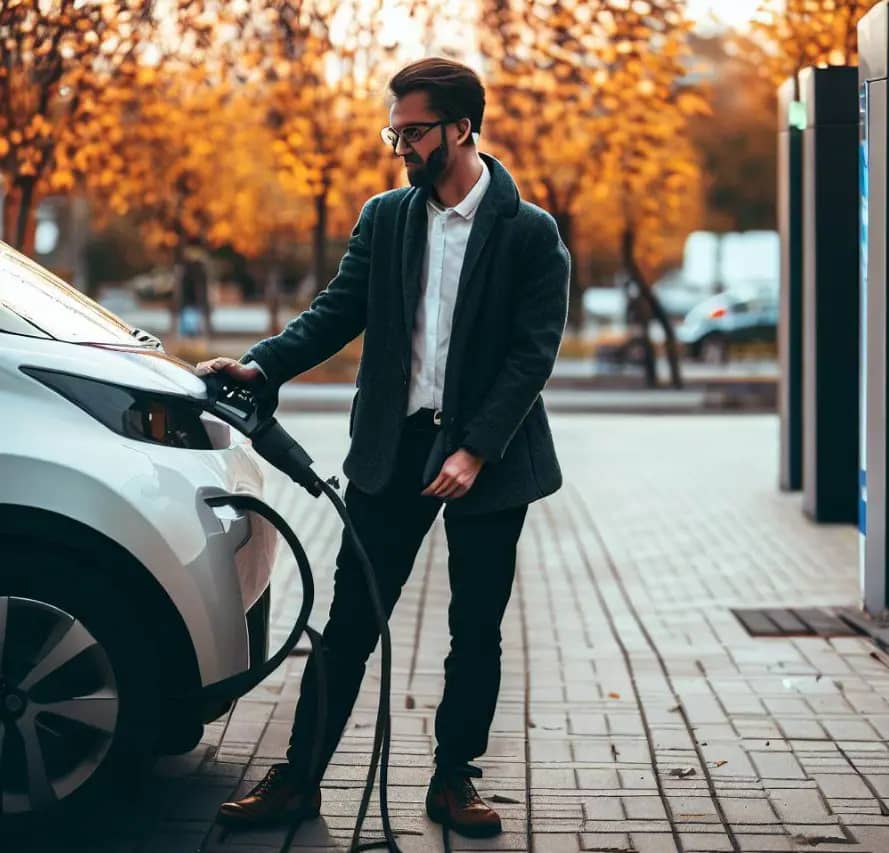Electric mobility is on the rise globally. Charging an electric vehicle (EV) at home is becoming common practice for many households. While it offers convenience and flexibility, charging an EV differs significantly from refueling a gas-powered car. It can be intimidating for new EV owners. But don’t worry, we’ve got you covered! In this article, we’ll guide you through the charging process step-by-step, so you can know how to charge EV at home.

Charging an electric vehicle (EV) at home is a convenient and straightforward process.
The easiest way to charge your EV at home is to use a standard wall outlet. However, this method is slow and adds only about 4 miles of range per hour. Additionally, it’s not very safe since there’s no protection from overloading your home’s electrical circuit.
A better, faster, and safer option is to use a dedicated home charging station.
Home charging is undoubtedly the most convenient way for EV drivers to charge their vehicles. In fact, 64 percent of EV drivers prefer to charge their cars at home, and it’s easy to understand why.
Charging at home is incredibly convenient since it allows you to charge your EV whenever and wherever you want. Instead of having to go out of your way to find a public charging station, you can plug your car in as soon as you come home, and it will be charged and ready to go the next time you need it.
Moreover, charging at home is usually cheaper than charging at public stations since you don’t have to pay any additional fees for using the service. This cost-saving factor is an essential consideration for many EV drivers.
Additionally, charging at home is also more reliable since you don’t have to worry about the availability of public charging stations or potential long wait times to use them.
Well, technically, you can charge your car by plugging it into a power socket at home, but it’s worth considering a home charger for safety, speed and convenience. The latter comes in handy when you need to charge your car regularly. Even though a charging station comes with a price tag, it’s a small price to pay for its efficient and simplified usage.
Imagine a scenario where a woman is parking her electric car in the driveway, while her friend is getting out of the car. On the right, an EVBox Elvi home charging station is mounted on the wall, ready to charge. The convenience of having a home charging station means that you can quickly and safely recharge your car at your convenience, instead of searching for a public charging station.
However, there might be situations where you can’t install a home charger. This could be due to a lack of space, inadequate wiring set-up around your parking space, or not having a parking spot at all. Nevertheless, you don’t have to give up on owning an electric car just because you can’t install a home charger. There are many other options available to charge your EV elsewhere, such as public charging stations or charging at your workplace.
It’s possible to charge your EV at home by plugging the cable that came with your car into a standard socket. But it is slow and lacks protection against power overloads. A standard 2.3 kW home power outlet would take about 24 hours to charge up a medium-sized EV with a 50 kWh battery. For example, the Tesla Model 3 Standard Range, to 80 percent.
Moreover, EV charging is highly energy-intensive, and improper management of it can easily overwhelm your home’s electrical circuit. This can lead to electrical hazards, and even pose a fire risk.
Imagine a scenario where a black electric car is parked in front of a modern house on a sunny day. A woman is approaching the vehicle while another person stands in the background, next to the house. If the car is charged using a standard socket, it can put a significant strain on the home’s energy supply.
Therefore, it’s essential to install a dedicated home charging station to ensure safe and fast charging for your EV. A home charging station offers protection against power overloads. It regulates power usage efficiently. And It ensures that your car is fully charged when you need it.
Home charging stations are specifically designed to handle energy-intensive loads and offer more control, making them the ideal solution for charging your electric vehicle. With a home charging station, you can unlock greater power and charging speed, which is not possible with a standard socket.
On average, it takes a dedicated EV home charger between 3 and 7 hours to fully charge a medium-sized EV, depending on factors such as the battery capacity and charging speed of the station. This is significantly faster than charging via a standard socket, which can take up to 24 hours or more.